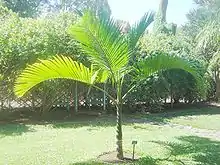| Hyophorbe indica | |
|---|---|
 | |
| Scientific classification | |
| Kingdom: | Plantae |
| Clade: | Tracheophytes |
| Clade: | Angiosperms |
| Clade: | Monocots |
| Clade: | Commelinids |
| Order: | Arecales |
| Family: | Arecaceae |
| Genus: | Hyophorbe |
| Species: | H. indica |
| Binomial name | |
| Hyophorbe indica | |
Hyophorbe indica, known commonly as palmier bâtard, palmiste poison, or champagne palm,[2] is a species of flowering plant in the family Arecaceae. It is endemic to the island of Réunion. It is threatened by habitat loss.
Description
The trunk of the tree is slender and is about 10 metres (33 ft) in height. It resembles the related Hyophorbe amaricaulis and Hyophorbe vaughanii, but with an inflorescence that branches in four (rather than three) orders, and orange-red fruits. The palm comes in 2 colours: The green one grows in the east coast of the Réunion, while the red one is endemic to Tampon region.[2]
Habitat
The palm can be found growing in moist forests on the elevation of 175–600 metres (574–1,969 ft).[1]
References
- 1 2 Johnson, D. (1998). "Hyophorbe indica". IUCN Red List of Threatened Species. 1998: e.T38579A10126091. doi:10.2305/IUCN.UK.1998.RLTS.T38579A10126091.en. Retrieved 14 November 2021.
- 1 2 "Hyophorbe indica". PACSOA. Retrieved January 29, 2013.
External links
 Media related to Hyophorbe indica at Wikimedia Commons
Media related to Hyophorbe indica at Wikimedia Commons Data related to Hyophorbe indica at Wikispecies
Data related to Hyophorbe indica at Wikispecies
This article is issued from Wikipedia. The text is licensed under Creative Commons - Attribution - Sharealike. Additional terms may apply for the media files.
